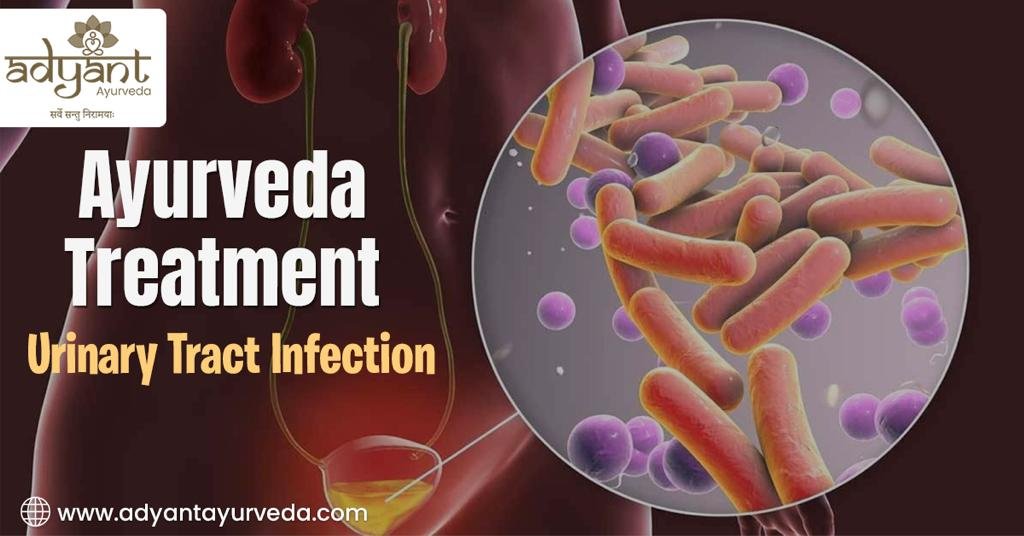Table of Contents
Toggle🔍 Introduction: UTI and Ayurveda’s Perspective
Urinary Tract Infections (UTIs) are one of the most common bacterial infections, affecting 50% of women at least once in their lifetime. The infection can involve the urethra, bladder, ureters, or kidneys and causes symptoms such as:
-
Burning urination
-
Urinary urgency and frequency
-
Lower abdominal or pelvic pain
-
Fever and fatigue
According to Ayurveda, UTIs are classified under the disease Mutrakriccha, which results from an aggravation of Pitta dosha along with Apana Vata disturbance. This imbalance affects the Mutravaha Srotas (urinary channels), leading to inflammation, discomfort, and infection.
💡 Want a personalized Ayurvedic consultation? Download our app “AyurCare” on Play Store and connect with expert doctors.
🩺 What Causes UTIs? (Ayurvedic and Modern View)
Modern Causes of UTIs
-
Bacterial infection (E. coli) from the GI tract
-
Sexual activity
-
Poor hygiene practices
-
Urinary tract abnormalities
-
Pregnancy and menopause
-
Diabetes and weak immunity
-
Use of catheters
-
Suppression of natural urination urge
Ayurvedic Cause (Nidana)
-
Pitta dosha aggravation leads to burning, infection
-
Apana Vata vitiation causes pain and interrupted flow
-
Aama (toxins) buildup blocks urinary channels
⚠️ Risk Factors – Who is More Prone?
-
Women (shorter urethra)
-
Elderly individuals
-
Sexually active women
-
Menopausal women
-
Diabetic patients
-
Pregnant women
-
Those with urinary stones or catheterization
🔍 Types of Urinary Tract Infections (UTIs)
| Type | Description |
|---|---|
| Urethritis | Infection of the urethra |
| Cystitis | Bladder infection |
| Pyelonephritis | Kidney infection |
🚨 Symptoms of UTI / Mutrakriccha
General
-
Persistent urge to urinate
-
Burning sensation while urinating
-
Cloudy, foul-smelling urine
-
Blood in urine (Hematuria)
-
Lower abdominal discomfort
Severe or Kidney Infection
-
Fever, chills, nausea
-
Pain in the sides or back
-
Vomiting
-
Fatigue
Special Cases
-
In Women: Pain during intercourse
-
In Men: Rectal pain
-
In Children: Bedwetting, unexplained fever
-
In the Elderly: Confusion, weakness
🌿 Ayurvedic View: Mutrakriccha Explained
In classical texts like Charaka Samhita, eight types of Mutrakriccha are mentioned. The common pathology involves:
-
Vitiated Pitta: Leads to heat, burning, inflammation
-
Vitiated Apana Vata: Causes pain, hesitation, interrupted flow
-
Dushya involved: Rasa, Rakta, Mamsa Dhatus
🌿 Top Ayurvedic Herbs for UTI
| Herb | Properties |
|---|---|
| Gokshura (Tribulus terrestris) | Diuretic, anti-inflammatory, and strengthens the urinary system |
| Punarnava (Boerhavia diffusa) | Swelling reducer, detoxifier |
| Shatavari (Asparagus racemosus) | Pitta pacifier, anti-inflammatory |
| Chandan (Sandalwood) | Cooling, anti-bacterial |
| Kaasni (Cichorium intybus) | Liver tonic, a coolant |
| Coriander Seeds | Pitta pacifying, detoxifying |
| Amla (Indian Gooseberry) | Immunity booster, cooling |
🏺 Herbal Ayurvedic Medicines for UTI
-
Chandraprabha Vati
-
Relieves burning sensation and inflammation
-
Dosage: 1–2 tablets twice a day after meals
-
-
Gokshuradi Guggulu
-
Strengthens the urinary tract
-
Dosage: 1–2 tablets twice daily with warm water
-
-
Shweta Parpati
-
Reduces acidity, inflammation, and alkalizes urine
-
Dosage: 125–250 mg with warm water
-
-
Punarnavadi Kashayam
-
Flushes toxins; supports kidney and bladder function
-
-
Varunadi Kashayam
-
Resolves pain, burning, and infection symptoms
-
-
Bacticheck Capsule (Proprietary)
-
Contains Neem, Guduchi, Manjishtha, Yashtimadhu – works like a herbal antibiotic
-
🏡 Home Remedies for UTI in Ayurveda
-
Tandulodaka (Rice Water): Relieves burning, discharge, and itching
-
Dhanyak Hima (Coriander Infusion): Cooling, balances Pitta
-
Amla Juice: Rich in Vitamin C, enhances immunity
-
Mint Water: Soothes the urinary tract and fights infection
-
Coconut Water and Sugarcane Juice: Flushes toxins, cools body
🥗 Diet and Lifestyle Guidelines
✅ Recommended
-
Coconut water, barley water, and coriander boiled water
-
Grapes, cucumber, pomegranate, plums
-
Sugarcane juice, amla, and coriander
-
Lukewarm water, boiled vegetables
-
Fiber-rich foods (for digestion and toxin removal)
❌ Avoid
-
Spicy, sour, fried food
-
Pickles, fermented food
-
Caffeinated drinks
-
Excessive heat, alcohol, and stress
✅ Hygiene Tips
-
Always urinate before and after sex
-
Wipe front to back
-
Don’t suppress the urge to urinate
-
Wear cotton underwear
-
Stay hydrated
🧘♀️ Yoga and Pranayama for UTI Relief
Yoga Asanas
-
Bhujangasana (Cobra Pose)
-
Dhanurasana (Bow Pose)
-
Malasana (Garland Pose)
-
Setu Bandhasana (Bridge Pose)
-
Supta Baddha Konasana
Pranayama
-
Nadi Shodhana (Alternate Nostril Breathing)
-
Sheetali Pranayama (Cooling Breath)
-
Bhramari Pranayama (Bee Breath)
🔄 Panchakarma Therapies for Chronic UTI
| Therapy | Purpose & Benefits |
|---|---|
| Virechana | Pitta detox via therapeutic purgation |
| Basti (Matra/Niruha) | Detox colon, restore Apana Vata balance |
| Uttar Basti | Direct bladder application of medicine – highly effective for recurrent UTIs |
| Uro Basti | Oil pooling on the bladder area relieves inflammation |
| Abhyanga & Swedana | Loosens toxins, opens channels, and improves immunity |
📊 Case Study Highlights
From real-world Ayurvedic case studies:
-
Improved lab reports (WBCs, bacteria, epithelial cells)
-
No recurrence in follow-up
-
No side effects
-
Success with both internal meds and Panchakarma
🌟 Why Choose Ayurveda for UTI?
✅ Treats root cause (Dosha imbalance)
✅ No antibiotic resistance
✅ Strengthens urinary immunity
✅ Safe for long-term use
✅ Detoxifies and rejuvenates the entire system
🏥 At Adyant Ayurveda, we offer personalized treatment plans, expert doctor consultations, and full Panchakarma support.
📲 Download the “AyurCare” App or
📞 Call us now to book your consultation!
🙋♀️ FAQs on Ayurvedic Treatment for UTI
Q1. What are the main symptoms of UTI?
Burning urination, urgency, cloudy urine, fever, pelvic pain.
Q2. What aggravates UTIs?
Spicy food, alcohol, low fluid intake, suppressed urination, and exposure to heat.
Q3. Which yoga helps with UTI?
Bhujangasana, Malasana, Setu Bandhasana, Pawanmuktasana.
Q4. What are the different types of UTIs?
Urethritis, Cystitis (bladder), Pyelonephritis (kidneys).
Q5. Is Panchakarma necessary for UTI?
In chronic/recurrent cases, Panchakarma like Basti and Virechana is highly beneficial.
Q6. Can Ayurveda prevent UTI recurrence?
Yes. By restoring doshic balance and urinary immunity, it prevents relapses.
Q7. Is it safe to use Ayurvedic medicine with antibiotics?
Yes, but under the guidance of an Ayurvedic physician.
📥 Book Your Consultation or Download Our App
Looking for safe, natural, and effective UTI treatment?
👉 Book Your Appointment at Adyant Ayurveda
👉 Download the AyurCare App on the Play Store
You can also read
FAQs
Some factors are –
Too much spicy or salty food aggravates UTIs.
Consuming alcohol aggravates UTIs.
Suppression of natural urge for urination.
Drinking less water.
Prolonged exposure to heat, toxic fumes, fire etc.
Yogasanas like Surya namaskar, Dhanurasana, and Malasana helps to alleviate symptoms of UTI.
Urination should be done frequently or whenever the urge arises to ensure that bacteria growth is prevented in the bladder and stay clean and dry.
Ayurvedic medicines make urinary tract treatment a natural and effective one and function to maintain normal PH Levels and diminish harmful bacteria without any side effects.
Some of the major symptoms are Burning urination, Frequent urination, Cloudy dark smoky urine, Foul smelling urine, Fever, Abdominal pain, pelvic pain in women and rectal pain in men.
Urethritis (Urethral infection), Cystitis (Bacterial infection in the bladder), and Pyelonephritis (Kidney infection) are some of the conditions of UTI.
Panchakarma helps in rejuvenating the human body and has desired results for infections in UTIs. It is recommended for UTI in very deep-rooted conditions. It is the holistic method of elimination of toxins and treats the root causes of diseases.






